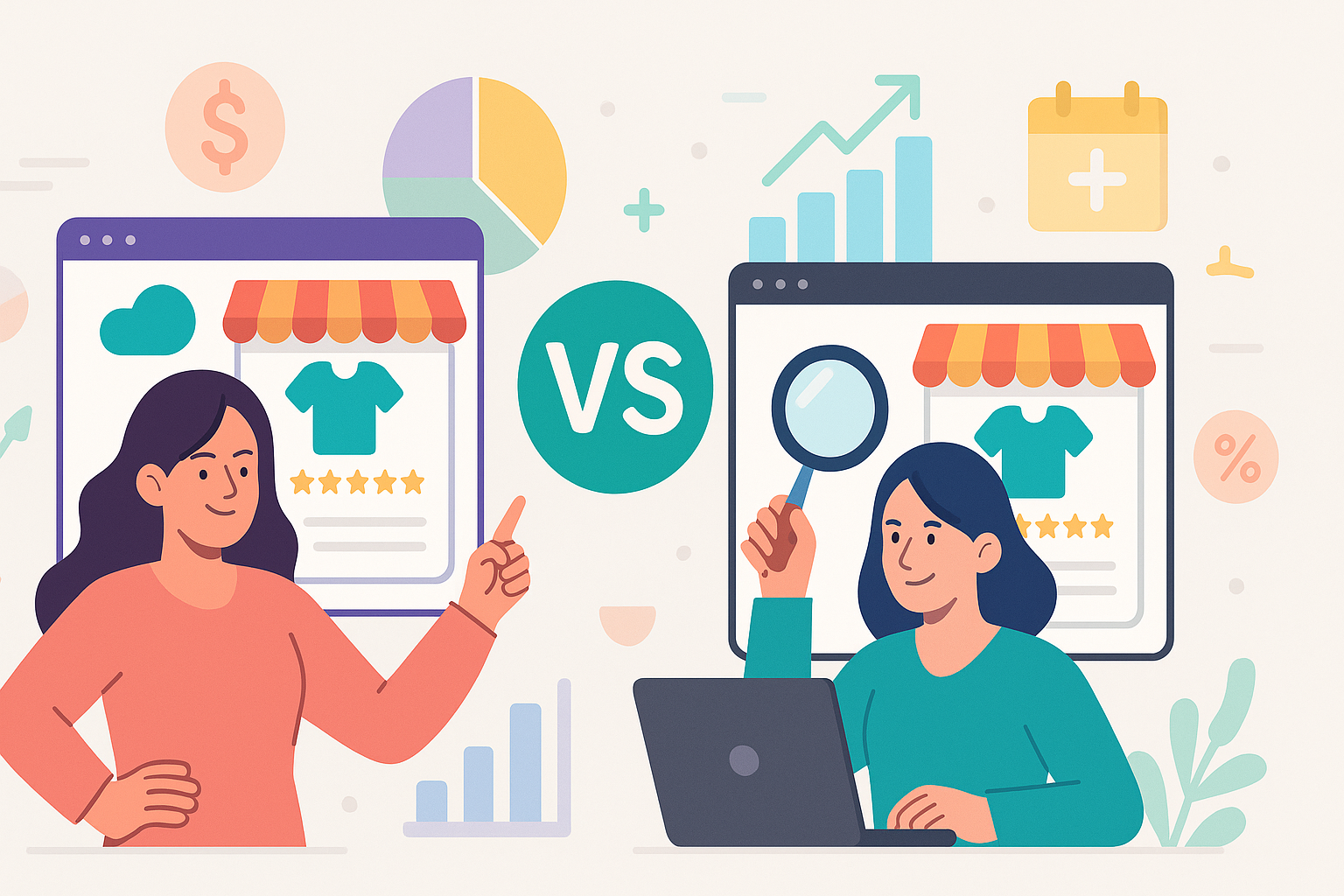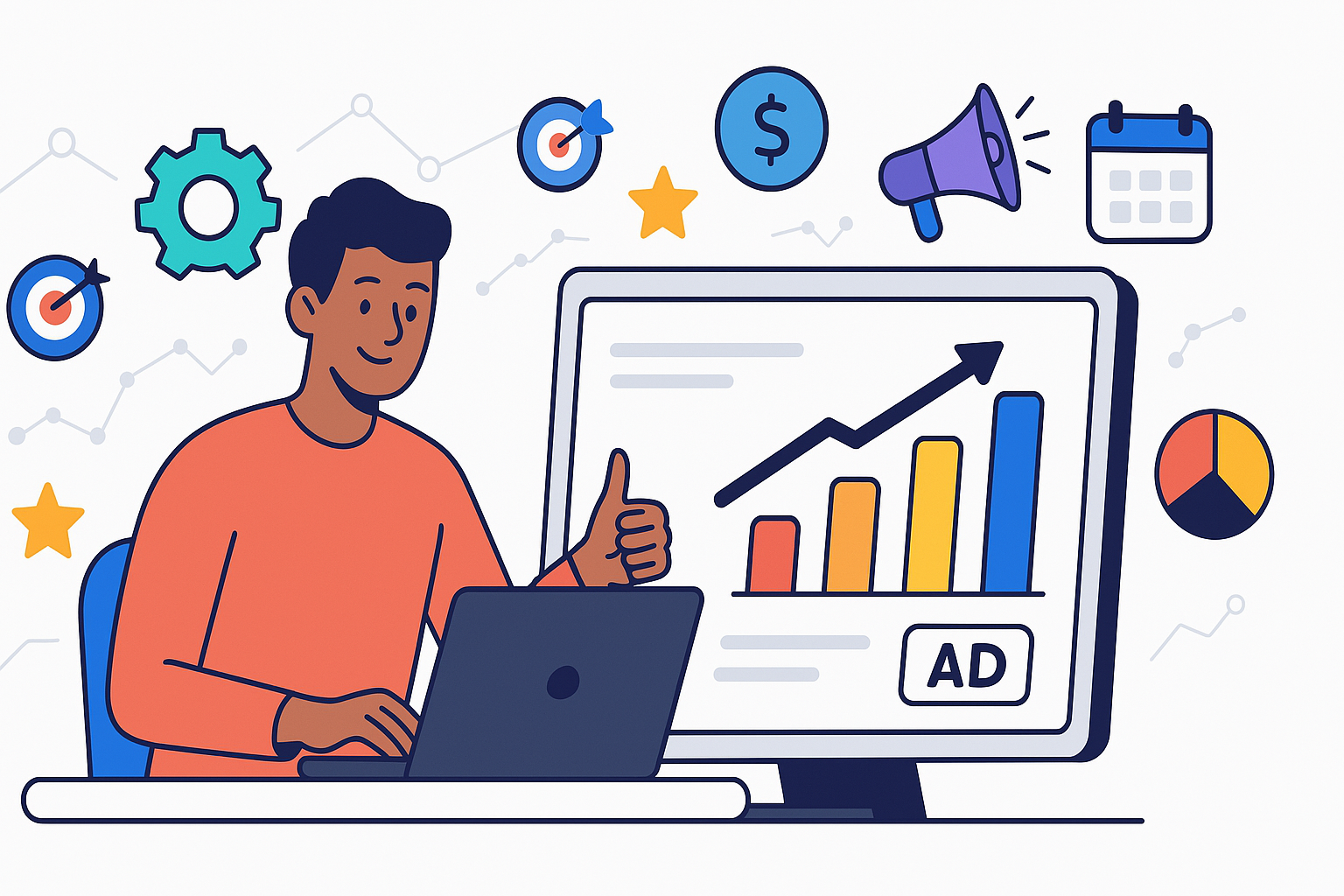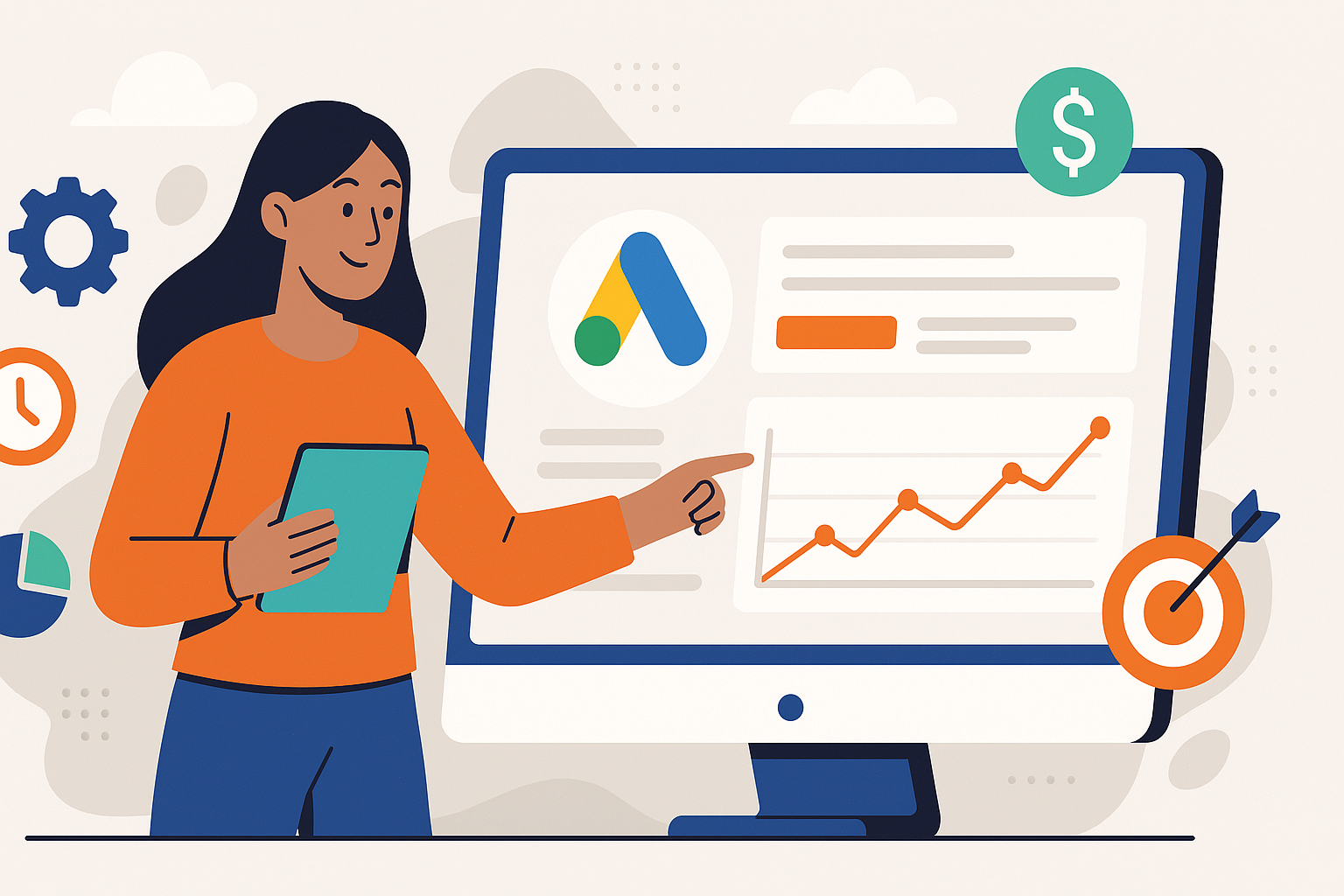Google Ads Consultant vs In-House: Which is Right for Your Business?
by Francisco Kraefft on 7 Oct, 2024
Navigating the complexities of Google Ads is crucial for business growth in today's digital landscape. A pivotal decision you face is how to manage these powerful campaigns. Should you entrust this critical function to an external Google Ads consultant or agency, leveraging specialized expertise? Or is building a dedicated in-house team the better route, embedding knowledge within your organization? This choice significantly impacts your marketing budget, campaign effectiveness, scalability, and ultimately, your return on investment. Understanding the fundamental differences, benefits, and drawbacks of each approach is the first step towards making an informed decision that aligns perfectly with your unique business goals, resources, and operational style. Let's explore the factors that will help you determine the optimal path for maximizing your Google Ads success.
Defining the Roles: Google Ads Consultant vs. In-House Team
Before weighing the pros and cons, it's essential to clearly understand the distinct nature of each option.
What is a Google Ads Consultant (or Agency)?
A Google Ads consultant, often operating independently or as part of a specialized digital marketing agency, is an external expert hired to manage your Google Ads campaigns. Think of them as specialists brought in for their deep knowledge and experience specifically within the Google Ads ecosystem (including Search, Display, Shopping, Video, App campaigns, and Performance Max).
Key Characteristics:
- External Resource: They are not direct employees of your company. They operate under a contract or retainer agreement.
- Specialized Focus: Their primary, often sole, focus is Pay-Per-Click (PPC) advertising, particularly Google Ads. This deep specialization allows them to stay abreast of the platform's constant updates, algorithm changes, and emerging best practices.
- Broad Experience: Consultants typically work with multiple clients across various industries. This exposure provides them with a wider perspective on what strategies work (or don't work) in different market conditions and business models.
- Tools & Technology: Agencies often invest heavily in premium third-party tools for competitor analysis, keyword research, bid management, and reporting, which might be cost-prohibitive for a single business.
- Objective Perspective: Being external, they can offer unbiased insights and recommendations based purely on data and performance, free from internal company politics or biases.
- Reporting Structure: You are the client. They report performance metrics, strategic insights, and recommendations directly to you or your designated point of contact.
What is an In-House Google Ads Team?
An in-house Google Ads team consists of one or more direct employees hired by your company specifically to manage your Google Ads account and potentially other digital marketing functions. They are fully integrated into your organization's structure.
Key Characteristics:
- Internal Resource: These are your employees, complete with salaries, benefits, and adherence to company policies.
- Dedicated Focus (Potentially Broader): While their primary role might be Google Ads, in-house marketers often wear multiple hats, potentially handling SEO, social media, email marketing, or content creation depending on the team size and structure. Their focus is exclusively on your business.
- Deep Company Knowledge: Being part of the organization, they develop an intimate understanding of your products, services, brand voice, company culture, internal processes, and overall business objectives.
- Direct Control & Integration: You have complete control over their day-to-day tasks, strategic direction, and priorities. Integration with other internal teams (sales, product development, content) can be seamless, facilitating faster communication and alignment.
- Knowledge Retention: Campaign knowledge, historical data insights, and strategic learnings stay within the company long-term.
- Reporting Structure: They report internally, typically to a Marketing Manager, Director, or CMO, following established company reporting procedures.
Understanding these fundamental operational differences is the foundation for evaluating which model best suits your specific needs and circumstances. Both have the potential for success, but they achieve it through different means and offer distinct advantages.
Expertise on Demand: Advantages of Hiring a Google Ads Consultant
Opting for a Google Ads consultant or a specialized agency brings a unique set of advantages, particularly appealing for businesses seeking immediate expertise and performance-driven results.
Here’s why many businesses choose this path:
- Access to Specialized Expertise: This is often the primary driver. Consultants live and breathe Google Ads. They possess deep, specialized knowledge of the platform's nuances, advanced features (like custom scripting, complex bidding strategies, audience segmentation), and frequent updates. They've likely encountered and solved challenges similar to yours many times before.
- Broader Industry Perspective: Working across diverse industries and client accounts gives consultants invaluable insights. They understand benchmarks, competitive landscapes, and effective strategies that transcend specific sectors. This cross-pollination of ideas can lead to innovative approaches you might not discover internally.
- Cost-Effectiveness: While agency retainers or consultant fees might seem significant upfront, consider the total cost of an in-house team: salary, benefits (health insurance, retirement contributions), payroll taxes, recruitment costs, training expenses, software subscriptions (advanced SEO/PPC tools), and overhead (office space, equipment). Often, hiring a consultant is demonstrably less expensive, especially for small to medium-sized businesses.
- Immediate Impact & Speed to Market: A seasoned consultant can hit the ground running. They have established processes for account audits, campaign setups, and optimization. This means faster implementation and quicker realization of results compared to hiring, onboarding, and potentially training an in-house employee.
- Access to Premium Tools & Technology: Reputable agencies invest in sophisticated analytics, reporting, competitor research, and automation tools. This technology provides deeper insights and efficiency gains that individual businesses might not be able to afford or justify.
- Objectivity and Data-Driven Focus: As external partners, consultants provide an unbiased view of your campaign performance. Their success is directly tied to your results (ROI, lead generation, sales). Agencies emphasize a data-driven approach, focusing relentlessly on measurable outcomes and continuous optimization based on performance metrics, not internal politics.
- Scalability and Flexibility: Need to scale up campaigns quickly for a seasonal push or scale back during slower periods? Agencies typically offer greater flexibility. You can adjust your service level or budget without the complexities of hiring or downsizing internal staff.
- Staying Ahead of the Curve: The digital marketing landscape evolves rapidly. Google Ads is notorious for its frequent updates. Dedicated consultants and agencies make it their business to stay current through continuous learning, industry conferences, and beta program participation, ensuring your campaigns leverage the latest features and best practices.
- Reduced Management Overhead: You manage the relationship with the consultant/agency, not the day-to-day tasks of an employee. This frees up internal management resources to focus on core business operations.
Choosing a Google Ads consultant provides access to a pool of specialized talent, advanced resources, and a performance-focused partnership designed to maximize your advertising ROI efficiently.
Building Internal Strength: Benefits of an In-House Google Ads Team
While consultants offer specialized expertise, building an in-house Google Ads capability provides a different set of compelling advantages centered around deep integration and long-term strategic alignment.
Consider the strengths of managing Google Ads internally:
- Unparalleled Brand & Product Understanding: Your in-house team lives and breathes your brand daily. They possess an intimate understanding of your company culture, values, unique selling propositions, target audience nuances, product intricacies, and overall business objectives that is hard for an external partner to replicate fully.
- Dedicated Focus: An in-house team's only client is you. Their time, energy, and focus are 100% dedicated to your campaigns and business goals. This undivided attention can lead to highly tailored strategies and proactive management.
- Seamless Integration & Communication: Internal teams naturally facilitate smoother collaboration with other departments. Aligning Google Ads campaigns with sales initiatives, content marketing schedules, product launches, or SEO efforts becomes much easier and faster. Quick internal meetings can resolve issues or pivot strategies rapidly.
- Complete Control & Transparency: You have direct oversight and complete control over every aspect of your Google Ads strategy, budget allocation, and execution. Access to raw data and campaign history is immediate and transparent within your own systems.
- Long-Term Knowledge Retention: Campaign learnings, historical performance data insights, testing results, and strategic knowledge are retained within the company. This institutional knowledge compounds over time, creating a valuable internal asset, assuming employee retention is managed well.
- Cultural Alignment: In-house staff are inherently aligned with your company culture and long-term vision. This can foster a greater sense of ownership and commitment to the brand's success.
- Potential for Broader Skill Development: You can invest in training your in-house team not just in Google Ads, but also in related disciplines like analytics, CRO (Conversion Rate Optimization), landing page design, or other marketing channels, creating more versatile internal marketing assets over time.
- Direct Feedback Loops: Feedback from sales teams about lead quality or customer service about campaign-related inquiries can be relayed and acted upon almost instantaneously, allowing for rapid campaign adjustments.
Developing an in-house team requires investment in hiring, training, and resources, but it offers the potential for deep integration, dedicated focus, and complete control over a critical marketing function.
Making the Right Choice: Factors to Consider for Your Business
The decision between a Google Ads consultant vs in-house team isn't one-size-fits-all. The optimal choice hinges on your unique business context, resources, and strategic priorities. Carefully evaluate these key factors:
1. Budget & Resources:
- Consultant/Agency: Typically involves a monthly retainer or project fee. Compare this against the fully loaded cost of an in-house employee (salary, benefits, taxes, tools, training, overhead). Agencies often provide more predictable costs and can be more economical, especially initially or for specific expertise levels.
- In-House: Requires significant upfront and ongoing investment in salary, benefits, recruitment, training, and potentially expensive marketing software/tools. Does your budget comfortably accommodate this?
2. Required Level of Expertise & Campaign Complexity:
- Are your campaigns relatively straightforward, or do they involve complex strategies, large budgets, multiple countries/languages, technical integrations (e.g., complex tracking, CRM integration), or highly competitive niches?
- Consultant/Agency: Excels in handling complexity due to specialized knowledge and experience with diverse, challenging accounts. They often have dedicated specialists for different areas (Search, Shopping, Display, Analytics).
- In-House: Can work well for simpler campaigns or if you can hire someone with proven, high-level expertise (which often comes with a higher salary). Building advanced expertise internally takes time and investment.
3. Business Size & Growth Stage:
- Startups/SMBs: Often benefit from the cost-effectiveness, flexibility, and immediate expertise of a consultant or agency, avoiding the heavy investment of building a team from scratch.
- Growing Businesses: May reach a point where the campaign scale and need for deep integration justify the cost of an in-house team or a hybrid model.
- Large Enterprises: Often have the resources for robust in-house teams but may still leverage agencies for specialized projects, audits, or to access cutting-edge strategies.
4. Need for Speed & Scalability:
- How quickly do you need to launch or scale your campaigns? Agencies can typically move faster initially.
- How much fluctuation do you anticipate in your advertising needs? Agencies offer easier scalability (up or down) compared to the HR processes involved with employees.
5. Integration with Other Marketing Efforts:
- How crucial is real-time, seamless integration with your sales, content, SEO, and product teams?
- In-House: Offers the tightest integration and communication flow.
- Consultant/Agency: Requires clear communication protocols and effort from both sides to ensure alignment. A good agency will proactively seek integration, but it's inherently less seamless than internal collaboration.
6. Desire for Control vs. Specialized Input:
- How much direct, day-to-day control do you want over campaign minutiae? In-house provides maximum control.
- How much do you value external expertise, objective viewpoints, and strategies potentially informed by broader market experience? Consultants provide this specialized input.
7. Long-Term vs. Short-Term Goals:
- Are you looking for immediate performance boosts and expert management (leaning towards consultant), or are you investing in building long-term internal marketing capabilities and knowledge assets (leaning towards in-house)?
Self-Assessment Questions:
- What is our realistic, sustainable budget for Google Ads management (including personnel/fees AND ad spend)?
- How complex are our current or planned campaigns?
- Do we have the internal resources (time, management capacity) to effectively manage an in-house person/team?
- How important is deep integration with other departments right now?
- What is our tolerance for the time and cost associated with recruitment and training?
- Do we value an external, objective performance perspective?
By honestly assessing these factors, you can gain clarity on whether leaning towards a Google Ads consultant or building an in-house team is the more strategic move for your business at this time.
Bridging the Gap: Exploring Hybrid Models and Choosing Your Path
The decision isn't always binary. Sometimes, the most effective approach involves blending the strengths of both external consultants and internal resources. Furthermore, whether you choose a consultant or build internally, selecting the right partner or personnel is paramount.
The Hybrid Approach: Best of Both Worlds?
A hybrid model combines elements of both in-house management and external consultancy. This can take several forms:
- In-House Execution, Agency Strategy: Your internal team handles day-to-day campaign management, optimization, and reporting, while an agency provides high-level strategic guidance, audits, training, or support for complex initiatives (e.g., setting up advanced tracking, launching new campaign types).
- Agency Core Management, In-House Support: An agency manages the core Google Ads campaigns, while your internal marketer focuses on landing page creation/optimization, creative development (ad copy, banners), lead follow-up coordination with sales, or managing smaller, complementary channels.
- Project-Based Consultancy: You maintain an in-house team but bring in consultants for specific, short-term projects like comprehensive account audits, competitive analysis, implementing advanced scripting, or training your team on new features.
Benefits of a Hybrid Model:
- Leverages external expertise without fully outsourcing.
- Allows the internal team to maintain brand closeness and integration.
- Can be cost-effective by targeting agency support where it's most needed.
- Facilitates knowledge transfer from the agency to the in-house team.
Challenges: Requires clear delineation of responsibilities, strong communication, and mutual respect between the internal team and the agency to avoid friction or redundant efforts.
Choosing the Right Google Ads Consultant or Agency
If you lean towards external expertise, selecting the right partner is critical. Look beyond flashy presentations:
- Proven Track Record & Case Studies: Ask for relevant case studies with measurable results. Can they demonstrate success with businesses similar to yours (industry, size, goals)?
- Data-Driven Approach: Ensure they prioritize data analysis, performance metrics, and ROI.
- Transparency & Communication: How will they report results? How often will you communicate? Look for clear, transparent reporting dashboards and proactive communication.
- Expertise & Certifications: Verify their team's experience and Google Ads certifications. Do they understand the specific campaign types relevant to you (Search, Shopping, PMax)?
- Customized Strategy: Avoid cookie-cutter approaches. A good consultant will take the time to understand your specific business, goals, and audience before proposing a strategy.
- Client References: Don't hesitate to ask for and check references.
- Cultural Fit & Relationship: You'll be working closely with them. Ensure there's a good rapport and you feel confident in their team.
Building an Effective In-House Team
If you opt for internal resources, success depends on more than just hiring someone:
- Clear Role Definition: Define the specific responsibilities and expectations for the Google Ads role(s).
- Hiring the Right Talent: Look for a blend of analytical skills, strategic thinking, platform proficiency, and a continuous learning mindset. Prior experience with similar budgets or industries is a plus.
- Investing in Tools: Budget for necessary software – keyword research tools, analytics platforms, potentially bid management or reporting software.
- Ongoing Training: The Google Ads landscape changes constantly. Allocate budget and time for continuous training and professional development.
- Setting Realistic Expectations: Understand that building expertise and achieving optimal results takes time, especially if hiring junior talent.
- Performance Measurement Framework: Establish clear KPIs and reporting processes internally.
Whether you choose a consultant, an in-house team, or a hybrid model, the ultimate goal is the same: strategic, data-driven Google Ads management that fuels business growth. Making a deliberate choice based on your specific needs is the first step towards achieving that success.
Conclusion
Choosing between a Google Ads consultant and an in-house team requires careful consideration of your budget, expertise needs, business size, and long-term goals. Consultants offer specialized knowledge, cost-efficiency, and scalability, ideal for many SMBs or those needing immediate, high-level expertise. In-house teams provide deep brand integration, dedicated focus, and complete control, often suited for larger organizations or those prioritizing internal capability building. Hybrid models offer a flexible compromise. Ultimately, the 'best' choice is the one that aligns strategically with your resources and objectives, enabling effective, results-oriented Google Ads management to drive sustainable growth.
Ready to maximize your Google Ads ROI with expert, data-driven management? Let our performance marketing specialists elevate your campaigns. Contact us today for a personalized consultation!


